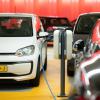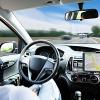Press Releases
Displaying Results 1 - 11 of 11
In the declaration issued following their latest meeting in Milan, G7 transport ministers have recognized the role of UNECE in advancing sustainable low-carbon mobility. In particular, they welcomed the recently adopted UNECE Strategy on Reducing Greenhouse Gas Emissions from Inland Transport,
UNECE’s Working Party on Automated/Autonomous and Connected Vehicles has adopted the draft of a new regulation that defines provisions for the approval of vehicles with Driver Control Assistance Systems (DCAS) and provides minimum safety requirements for vehicles equipped with the Advanced Driver
UNECE’s Working Party on Automated/Autonomous and Connected Vehicles today decided to include motorcycles, scooters and electric bicycles with speed exceeding 25 km/h in the scope of the UN Regulation No. 155 on cyber security and cyber security management.
In force since January 2021, UN
A new milestone in mobility has been reached with the adoption of a proposal to extend automated driving in certain traffic environments from the current limit of 60 km/h to up to 130 km/h.
The amendment to UN Regulation No. 157 adopted today by the World Forum for Harmonization of Vehicle
The World Forum for Harmonization of Vehicle Regulations (WP.29) has adopted an amendment to a United Nations Regulation on Automated Lane Keeping Systems (ALKS) that lays down the technical requirements for their use in heavy vehicles including trucks, buses and coaches. This step marks the first
Some 60 countries have reached a milestone in mobility with the adoption of a United Nations Regulation that will allow for the safe introduction of automated vehicles in certain traffic environments.
The UN Regulation establishes strict requirements for Automated Lane Keeping Systems (
The automotive sector is undergoing a profound transformation with the digitalization of in-car systems that are necessary to deliver vehicle automation, connectivity and shared mobility. Today, cars contain up to 150 electronic control units and about 100 million lines of software code – four
Autonomous vehicles are expected to bring enormous benefits to society in terms of enhanced mobility and increased safety. However, these benefits will only materialise if autonomous technologies are introduced in a transparent manner and based on the best global expertise and international
Automation in transport, including “self-driving” autonomous vehicles, has the potential to improve the lives of billions of people and transform mobility as we know it. It could enable a safer, more efficient, accessible and ecological means of transport. It could also ultimately save billions of
Some 40 Countries have agreed on a draft United Nations Regulation for Advanced Emergency Braking Systems (AEBS) for cars. This will significantly improve road safety, especially in cities, where in the European Union alone, over 9,500 fatalities were recorded in 2016, accounting for 38% of all
As self-driving cars slowly edge towards commercial reality, with companies such as Mercedes-Benz, Continental, Tesla, Denso, or Google getting in gear, regulatory action has already started at UNECE. Under the auspices of the World Forum for harmonization of vehicle regulations, the UNECE Working






